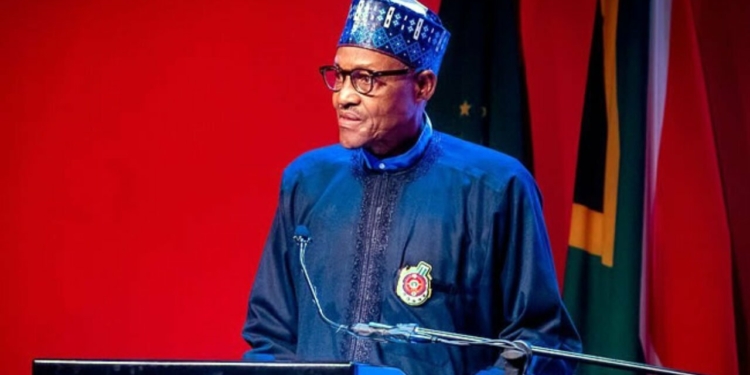President Muhammadu Buhari on Monday said despite the challenges posed by misinformation and hate speech, the world must come together to defend freedom of speech and uphold other cherished values.
President Buhari stated this at the opening session of the the11th edition of the UNESCO Global Media and Information literacy week at the State House Conference Centre, Abuja.
The theme of the Week is “Nurturing Trust, a Media and Information Literacy Imperative,” which focused on the use of MIL to address a fundamental element of human and national development, which seems to be waning in most societies of the World.
The President noted that trust is a key ingredient of democracy and good governance, saying: “Without trust, our avowed pledge to deliver on our promises as leaders will be impeded by the lack of commitment from the governed.”
President Buhari, who was represented by his Chief of Staff, Prof. Ibrahim Gambari, said, “As it is evident in our societies, getting reliable information is a constant battle. Media practitioners and stakeholders within the sector face the clear and present danger of misinformation.
“Misinformation has been used to aggravate conflicts and crisis, exacerbate insecurity, distort government efforts, fuel apprehension among the citizens and create distrust between the governments and their peoples.
“With regard to the use of social media which also underscores its potential to mold, shape and form an opinion, we may note the following key statistics: 59% of the World population uses social media which represents 3 out of every 5 people on earth
“Average daily use is estimated to be about 2 hours 29 minutes which is approximately 149 minutes or 31 minutes shy of the equivalent of sitting and watching 2 consecutive football games of 90 minutes each
“Over 70% of the people who use social media are 13 years and older. Of the top 4 social media platforms 3 are interactive sites Facebook, Whatsapp and Instagram
“Here in Nigeria with a population of about 220 million people, 37% is under 34 years and the country has about 100 million internet users, of which about 32 million are social media users.”
Continuing, Buhari said with above indices, “we fully recognize and are cognisant that Technology and social media offer us nearly limitless opportunities which must be harnessed especially by the youth to strengthen the foundations of our society and our common values.
“However, in confronting challenges of rising misinformation and hate speech we must also come together to defend freedom of speech, whilst upholding other values that we cherish.
“We must continue to work for a common standard that balances rights with responsibilities to keep the most vulnerable from harm and help strengthen and enrich our communities and most importantly strengthen trust and social cohesion by improving critical thinking competencies to adequately assess the quality of information received and shared which I believe is a key component of the MIL programme this week.”
The President observed that the MIL has over the years proven to be a veritable tool in building the capacities of individuals and communities to learn, decipher, educate and effectively use data and information for the common good.
In this regard, he congratulated UNESCO and all key stakeholders for their efforts in developing various initiatives and resources around the use of MIL to help in nurturing trust and countering mistrust.
He also commended their efforts in promoting the teaching and learning of MIL in formal and non formal institutions, as well as the establishment of the Global MIL institutes.
President Buhari pledged his administration’s continued support for policies and plans aimed at advocating the use of MIL to create a peaceful and cohesive society where trust and respect for each other become a norm.
He further said, “Already, our collaboration with UNESCO and other partners has stimulated the development and promotion of MIL policies at all levels of government as well as strategies aimed at helping citizens to learn and imbibe the skills of MIL.
“In furtherance of this mission, we encouraged the establishment of the MIL Coalition of Nigeria (MILCON) in 2017, a Coalition established to facilitate coordination of interventions on MIL in Nigeria and promote synergy among stakeholders.
“These efforts have resulted in mainstreaming and domesticating the UNESCO MIL in the Curriculum of our Colleges of Education, by its inclusion in the General Studies Education component of the Nigeria Certificate in Education Minimum Standards curriculum, as a compulsory subject.
“In addition to this, information Science and Media studies, which is an adaptation of the MIL Curriculum, is now domiciled in our newly unbundled Mass Communication curriculum for all the Universities in Nigeria as recently unveiled by the National Universities Commission.”
In his remarks earlier, the Director-General (DG) of Audrey Azoulay, represented by Mr. Tawfik Jelasi, Assistant DG, Communication and Information sector, UNESC, wondered how the world can ensure that information is a public good is preserved as such.
She stressed the need to collaborate with tech companies, work on the demand and supply side, and as well, the users of the platforms to make them media and information literate.
The UNESCO DG counseled that people should authenticate the sources of information before liking and sharing, noting that the organization is embarking on awareness to integrate these into the educational system.
“We need to act now to make cyber space, a place truly for information for the public good,” she affirmed.










Discussion about this post